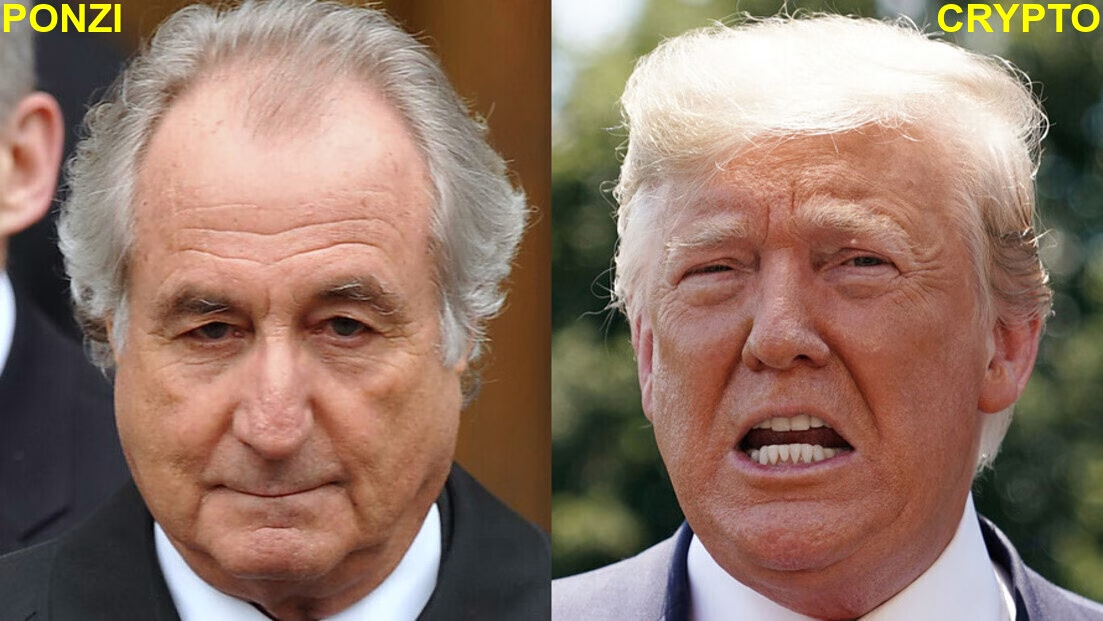By Don Terry & Mary Jones | Saturday, March 15, 2025 | 5 min read
The American justice system has a long history of catching up with those who abuse financial markets and betray public trust. Bernie Madoff, once a revered financial figure, ultimately faced justice for orchestrating the largest Ponzi scheme in history. While Donald Trump has evaded accountability time and again, his foray into cryptocurrency—an industry rife with fraud, market manipulation, and regulatory scrutiny—could be the Achilles’ heel that finally brings him to justice. Allegations of misleading investors, artificially inflating asset values, and potential violations of financial regulations make his involvement particularly vulnerable to legal action.
Trump’s ability to sidestep legal consequences is legendary. From his real estate dealings to his time in the White House, he has mastered the art of operating in legal gray areas. As he famously boasted, he could shoot someone on Fifth Avenue and not lose support—an indictment not just of political loyalty but of a system that has repeatedly failed to hold him accountable.
Despite numerous investigations, lawsuits, and even impeachments, Trump has remained largely untouched. The FBI and the Department of Justice under the Biden administration have been hesitant to take bold action, either due to political constraints or fear of public backlash. However, the tides could turn with a new administration that prioritizes financial transparency and regulatory enforcement. A leadership shift could bring renewed focus on investigating high-profile financial crimes, including Trump’s alleged misconduct in the cryptocurrency sector. Strengthened regulatory policies and a Justice Department willing to act could make accountability a real possibility.
The crypto industry has been a hotbed for both innovation and fraud. From pump-and-dump schemes to outright theft, regulators have struggled to keep up with the rapidly shifting landscape. Reports suggest that Trump’s ventures into crypto have been less than above board, with allegations of misleading investors, artificially inflating values, and failing to deliver on promises.
Unlike his political dealings, financial crimes tend to leave clear paper trails—or, in the case of cryptocurrency, blockchain records that provide an immutable ledger of transactions. These records can be analyzed to trace the flow of funds, identify fraudulent activities, and link them directly to individuals involved in illicit schemes.
If a future Department of Justice were to take on this case seriously, it could expose a web of fraudulent transactions, much like what happened in the Madoff case. Victims of these schemes, many of whom may have supported Trump politically, would have legal standing to demand restitution through civil lawsuits or class action claims. Courts could order Trump to return misappropriated funds, and government agencies could step in to enforce financial penalties. This legal process would be similar to how investors in past financial fraud cases have sought compensation for their losses.
The Supreme Court’s Ruling and Trump’s Financial Liabilities
Recently, the Supreme Court ruled that a president cannot be criminally charged for actions taken while in office. While this decision raises serious concerns about presidential immunity, it does not grant protection against financial liability. If Trump deceived investors through fraudulent cryptocurrency dealings—whether as a private citizen or during his presidency—he could be held financially accountable.
Courts have previously forced figures like Bernie Madoff to return misappropriated funds, allowing victims to recover at least a portion of their losses through restitution and asset seizures. This case serves as a powerful reminder that even the most influential individuals cannot escape the financial consequences of fraud.
Madoff’s downfall was not just a legal victory; it was a moral one. Justice was served when his victims were compensated (to some extent) through asset seizures and legal restitution.
The same could happen with Trump’s alleged crypto dealings. Courts have historically been more willing to enforce financial judgments than to pursue political figures criminally.
For example, in the case of O.J. Simpson, while he was acquitted of criminal charges, he was later found liable in a civil court and ordered to pay millions in damages.
Similarly, financial fraud cases, such as those involving Enron executives, resulted in significant financial penalties even when criminal charges were challenging to prosecute. Holding Trump accountable financially may be the most effective route.
Justice is often slow, but it does not forget. While Trump has evaded serious consequences thus far, history shows that financial crimes catch up with even the most powerful individuals. Whether it is through a new administration, an emboldened justice department, or relentless legal pressure from victims, Trump may one day face the financial reckoning he has long avoided.
America has seen high-profile figures fall from grace when their financial misdeeds were too big to ignore. If Trump’s cryptocurrency dealings follow the pattern of deception and fraud seen in other parts of his business empire, it is only a matter of time before the walls close in. The question is not if, but when.
The current Justice Department, under his former lawyer AG Bondi and Kash Patel, is unlikely to investigate any wrongdoing when it comes to Trump, particularly regarding his cryptocurrency dealings However, over time, citizens will demand justice and push for accountability.
Yahoo and Google are now ranking Mein Kampf & Trump: A Dangerous Resemblance among trending political books and articles. What’s fueling the attention? Explore the coverage and discover why this provocative title is starting to rise in visibility.
- Yahoo Ranking: https://bit.ly/4lmhSCz
- Google Ranking: https://bit.ly/44LFppG
- Prlog: https://bit.ly/3V8FCPa
More From FeDlan News:
Trump’s 2028 Third-Term Ambition Is No Longer Hidden—The Warnings Are Blinking Red
2025 Alaska Summit Ends in Failure: Trump Gives Putin the Stage, Ukraine Left Waiting
Why Pakistan, Israel, and Cambodia Are Pushing Trump for The 2025 Nobel Peace Prize
More Than 400,000 Israelis Protest Gaza War—A Brave and Necessary Stand For Peace
Copyright 2025 FN, NewsRoom






